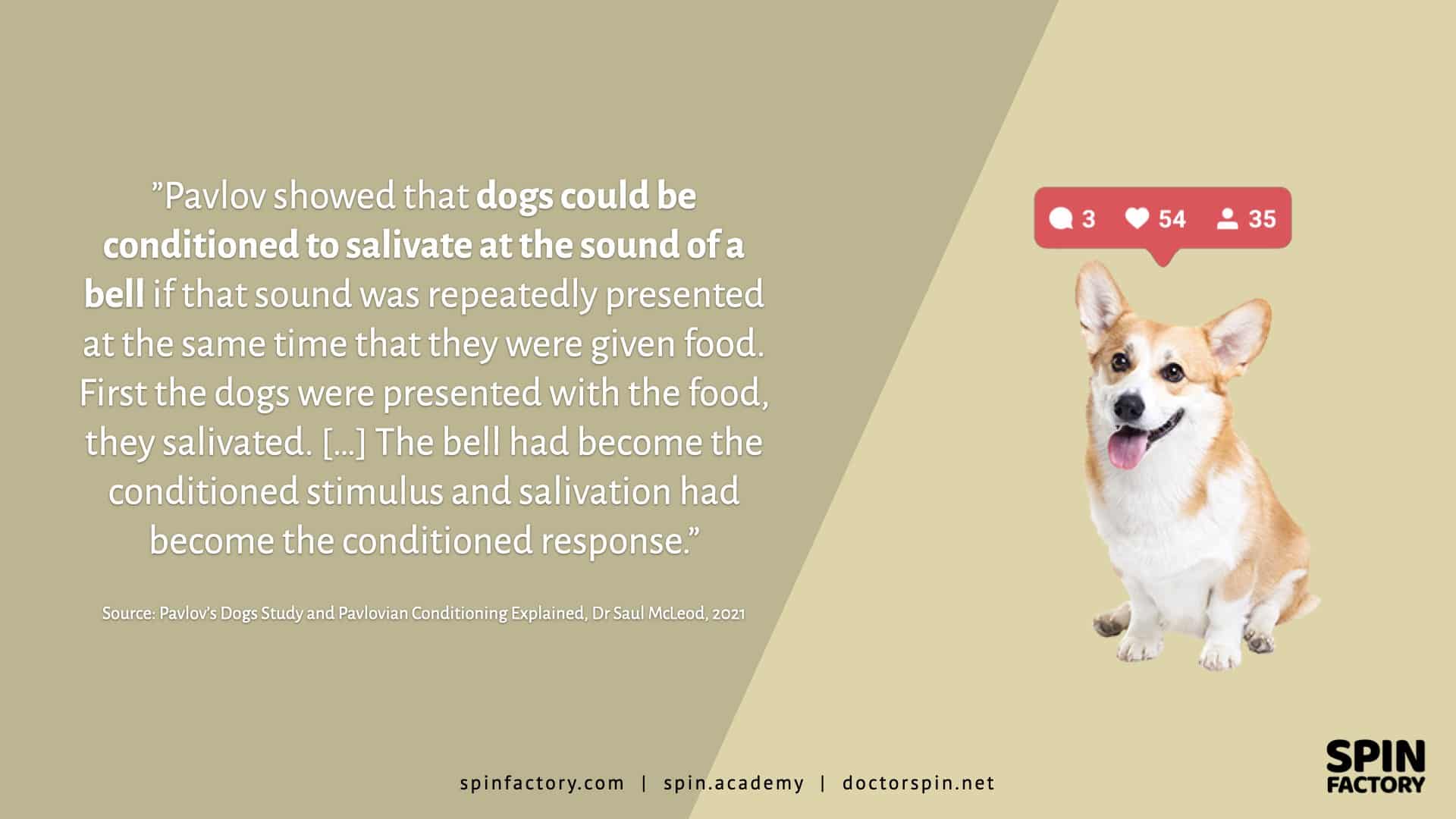I use Pavlov’s Inbox to manage my incoming emails.
I’m not a fan of Inbox Zero. I get the general idea behind the popular email productivity system, but it’s not for me.
I favour another approach:
Therefore, I use a proactive system based on operant conditioning to reward or punish inbound email senders. 1There is, of course, the issue of spam, unauthorised solicitation, and pointless social network notifications. However, these should be filtered, not personally managed.
I call it Pavlov’s Inbox.
Here we go:
What Is Pavlov’s Inbox?
Spin Academy | Online PR Courses
Pavlov’s Inbox
Most email productivity systems (e.g. Inbox Zero and similar systems) focus on structure and efficiency. Such systems run the risk of rewarding unfavourable sender behaviours.
Pavlov’s Inbox is a system built around the psychological idea that your inbox problems aren’t email problems — they’re sender problems.
Pavlov’s Inbox assumes that you can influence the behaviours of those sending you emails — via conditioning.
The typical result of Pavel’s Inbox is that you quickly get more and more good emails from favourable senders and fewer and fewer bad emails from unfavourable senders.
The basic rule of behavioural psychology is that you get more of what you reinforce.
How To Reward Favourable Senders
How To Punish Unfavourable Senders
Please note that the punishing aspect should be executed in a socially viable manner (since being confrontational or aggressive as “punishment” is likely detrimental to your professional reputation).
Learn more: Pavlov’s Inbox
💡 Subscribe and get a free ebook on how to get better PR.

The Power of Conditioning
In classical conditioning, psychologist Ivan Pavlov made dogs salivate by hearing the sound of a triangle. Every time he fed the dogs, he played the sound. Soon, he could play the sound to elicit the dogs’ physical response (salivation) — without the food. 2Classical conditioning. (2023, January 17). In Wikipedia. https://en.wikipedia.org/wiki/Classical_conditioning
In operant conditioning (also called instrumental conditioning), the strength of an existing behaviour is modified by reinforcement or punishment. 3Operant conditioning. (2023, January 13). In Wikipedia. https://en.wikipedia.org/wiki/Operant_conditioning
So, where classical conditioning elicits an involuntary behavioural response (“reflexes”), operant conditioning modifies existing behaviour (“voluntary”).
Both methods modify behaviour by conditioning, and the distinction between these two approaches isn’t clear-cut. While salivation can be seen as a “reflex,” wanting treats despite not being hungry has elements of being a voluntary behaviour. And modifying behaviour to seek reinforcement actively or escape punishment can be more or less unconscious.
To affect inbox behaviours, we wish to modify existing behaviours through reinforcement or punishment (operant conditioning) but do it discretely so that the behaviours become reflexes (classical conditioning).
How To “Punish” Bad Senders
If you always reply to emails promptly and with added value, some senders will quickly pick up on this — and send you more emails of the same type. In some cases, this is desirable, but not always.
What if people take advantage of your prompt replies? The Inbox Zero system makes no such distinction.
For many emails landing in your inbox, you must push back against the senders — by creating social discomfort for them.
So, you keep rewarding senders of favourable emails by complying swiftly. If someone asks you to do something and you — for whatever reason — want to do it, you do it.
This behaviour on your part will increase your chances of getting more of these favourable emails.
But how do you “punish” senders of unfavourable emails?
By gently “punishing” senders of unfavourable emails, you’ll have to send a few extra emails at the beginning of relationships. The idea: A little extra effort upfront, much less effort down the line.
Affiliate: I use Mailchimp as my default email list manager.
Example: The Unnecessary Meeting
My colleague “John” wants to chat, but I know from experience that he will use every opportunity to push his work onto my plate.
| ••• |
|---|
| To: Jerry Subject: Meeting about X Hi Jerry, Can we have a meeting about X? Kind regards, John |
| ••• |
|---|
| To: John Subject: RE: Meeting about X Hi John, Please send an agenda detailing the decisions we need to make, and I’ll see if I can make it work. Thanks, Jerry |
| ••• |
|---|
| To: Jerry Subject: RE: Meeting about X Hi Jerry, No need for an agenda, I think. I only need your input. Kind regards, John |
| ••• |
|---|
| To: John Subject: RE: Meeting about X Hi John, I get it, but I’ll need some background. Can you assemble a document outlining the scope and send me the pdf? Thanks, Jerry |
| ••• |
|---|
| To: Jerry Subject: RE: Meeting about X Hi Jerry, No need for a background document, either. I can brief you at the meeting. Kind regards, John |
| ••• |
|---|
| To: John Subject: RE: Meeting about X Hi John, All right, but please tell me in writing what decisions we should make in this meeting. My workload is massive right now and I must prioritise actionable meetings. Thanks, Jerry |
| ••• |
|---|
| To: Jerry Subject: RE: Meeting about X Hi Jerry, Okay, I’ll ask Charlotte instead if your workload is that high. Kind regards, John |
I’m not saying no to John, but I keep asking him to do extra work before considering his request. After some initial back-and-forth, emails like this will cease.
Arguably, I could say no to John upfront, but that would turn him into a “workplace enemy” — and provide him with undisputable proof that I’m unwilling to aid a colleague in need. In most cases, this is a drama I can live without.
Read also: 7 Surefire Ways To Dominate Office Politics
Example: The Scope Creep
The client deal is finalised and signed, but once the project is underway, my client, Miranda, tries to get us to do more than we agreed.
| ••• |
|---|
| To: Jerry Subject: Regarding the deliverable Hi Jerry, We need the deliverable two days earlier. And we also need to add a couple more journalists to the outreach. Can we make this work? Kind regards, Miranda |
| ••• |
|---|
| To: Miranda Subject: RE: Regarding the deliverable Hi Miranda, I can check with the production team and draft a brief proposal for the added effort. Can you confirm that you want me to proceed? (Y/N) Thanks, Jerry |
| ••• |
|---|
| To: Jerry Subject: RE: Regarding the deliverable Hi Jerry, Didn’t realise that it was going to cost extra. I think we’ll have to make do with the existing scope. No need to make any changes. Kind regards, Miranda |
| ••• |
|---|
| To: Miranda Subject: RE: Regarding the deliverable Hi Miranda, No worries, we’ll make sure to proceed according to plan. Kind regards, Jerry |
By pushing work back on Miranda (making a problematic budget decision), she opted not to ask us to work for free.
If Miranda had said yes, the email conversation would have moved into the pile of favourable emails. More importantly, you’re unlikely to get unsolicited requests from Miranda in the future.
Example: The Free Lunch
An acquaintance is reaching out asking if he can buy me lunch. It could be nice to catch up, but he’ll only talk about himself and his business.
| ••• |
|---|
| To: Jerry Subject: Lunch? Hi Jerry, Long time no see. I read your awesome blog post on deep content the other day, and I’d love to pick your brain about a cool project I got going on. Would you let me buy you lunch next week? Kind regards, Eric |
| ••• |
|---|
| To: Eric Subject: RE: Lunch? Hi Eric, All is well. How are you? And thanks for checking out the blog. Sounds intriguing. While I check my calendar for openings, could you put together a brief? When giving advice to startups, I like to come prepared. Thanks, Jerry |
| ••• |
|---|
| To: Jerry Subject: RE: Lunch? Hi Jerry, Hey man, to be clear: this is not a brief. I just want to pick your brain over lunch. Would love to catch up. Kind regards, Eric |
| ••• |
|---|
| To: Eric Subject: RE: Lunch? Hi Eric, Sorry, I only advise clients — or potential clients. It has to do with accountability and some other legal stuff. Thanks, Jerry |
| ••• |
|---|
| To: Jerry Subject: RE: Lunch? Hi Jerry, Aha, I didn’t know that. But we might be interested in becoming your client down the line. Kind regards, Eric |
| ••• |
|---|
| To: Eric Subject: RE: Lunch? Hi Eric, All right, I’ll see what I can do. In the meantime, could you send an NDA (non-disclosure agreement)? This is for both of our sakes. We don’t want to get in trouble for discussing sensitive business information. Thanks, Jerry |
| ••• |
|---|
| To: Jerry Subject: RE: Lunch? Hi Jerry, Hmm, sounds a bit like we aren’t ready yet. I just wanted to pick your brain over lunch, haha. Kind regards, Eric |
| ••• |
|---|
| To: Eric Subject: RE: Lunch? Hi Eric, No worries, man. I love your startup idea and am sure you’re onto something big. I’m here for you as soon as you’re ready to step it up to the next level. Until then, Jerry |
By pushing back on professionalism, I’m forcing Eric to say no first — which puts us back on equal footing.
More Emails Upfront, Less (But Better!) Emails Down the Line
You’re right if you think the “pushback approach” seems like more emails back and forth upfront. But you’re investing in relationships instead of a folder system.
Soon, your inbox will start filling up with the kind of emails you want instead of the emails other people want to send you. Not only will you be more productive, but you’ll also be able to produce more value.
Perhaps, perhaps not. If you feel uncomfortable, remember that scope creep, unnecessary meetings, and working for free aren’t sustainable in the long run.
And, if you’re still a fan of email productivity systems like Inbox Zero, don’t worry. Just create a folder named “Push Back.”

THANKS FOR READING.
Need PR help? Hire me here.

PR Resource: Productivity Hacks
Spin Academy | Online PR Courses

Personal Projects: Life Design Ideas
In addition to being a PR professional, I strive to live smarter, and I sometimes stumble upon ideas worth writing down when I consider these matters.
Life Design Ideas
Learn more: Lifestyle Design
💡 Subscribe and get a free ebook on how to get better PR.

Annotations
| 1 | There is, of course, the issue of spam, unauthorised solicitation, and pointless social network notifications. However, these should be filtered, not personally managed. |
|---|---|
| 2 | Classical conditioning. (2023, January 17). In Wikipedia. https://en.wikipedia.org/wiki/Classical_conditioning |
| 3 | Operant conditioning. (2023, January 13). In Wikipedia. https://en.wikipedia.org/wiki/Operant_conditioning |



